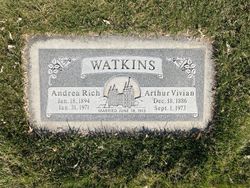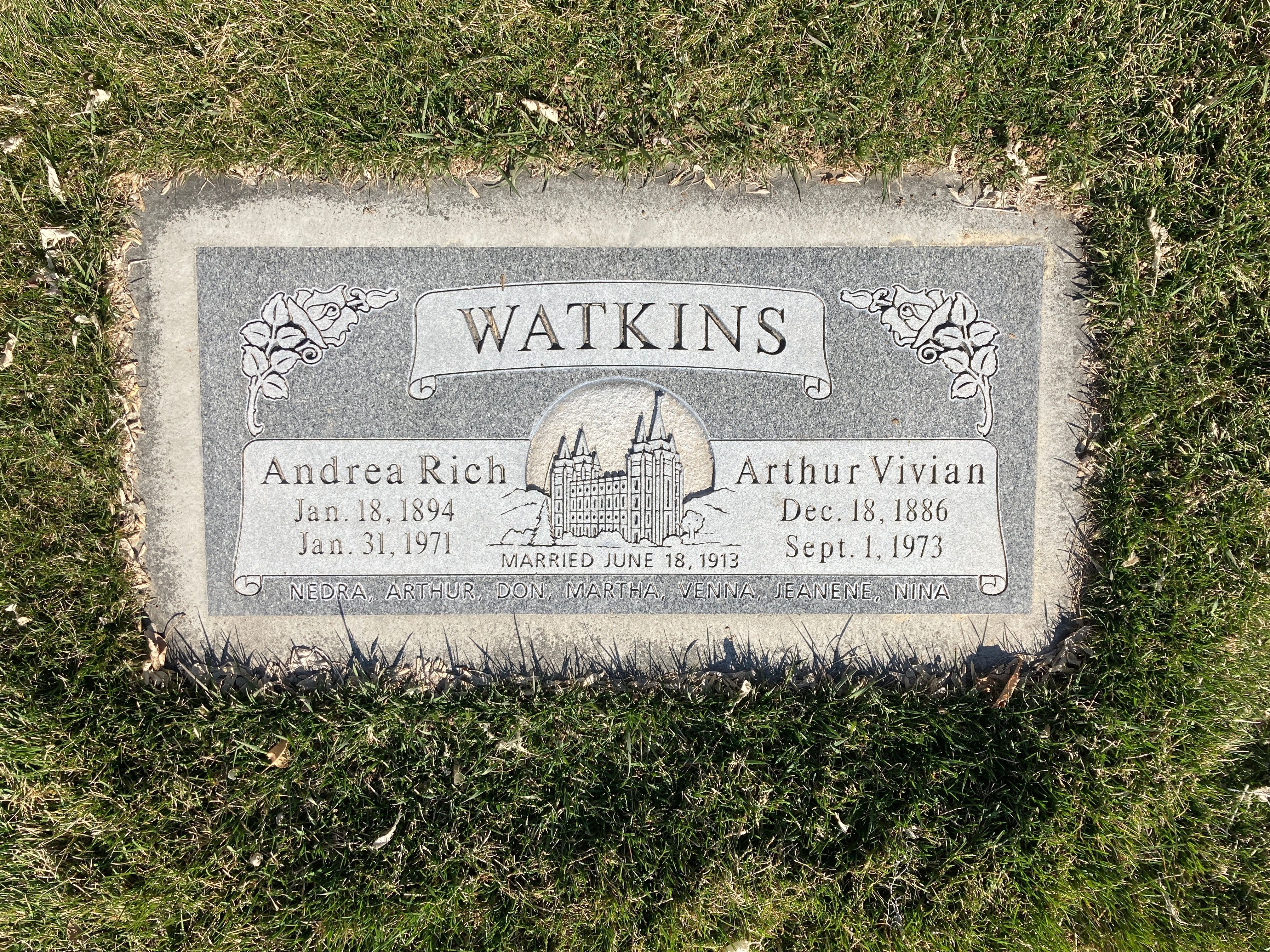1894 - 1971
PORTRAIT OF A SENATOR'S WIFE:
MRS. ARTHUR WATKINS
By David Barnett
WASHINGTON (NANA) -- The woman in the life of Senator Arthur V. Watkins has a "magic phrase" she inherited from her mother. During 41 years of marriage and the rearing of six children, the phrase has always worked to turn serious family situations into relaxed ones that could be laughed away. The phrase is: "Oh, pooh!"
That is about the strongest language you are likely to hear in the household of the senior senator from Utah, the chairman of the Senate committee that recommended censure of Senator Joseph R. McCarthy.
Mrs. Andrea Rich Watkins, whose white hair, clear blue eyes, and open smile [illegible] a happy woman with 14 grandchildren, did not attend the censure hearings. She followed the case carefully but she did not want to be a "spectator." She explains: "The hearings were sad and serious. I did not want anyone to think I was being entertained by the charges. Do you know what I mean? It wasn't something to be watched like a sports contest, a spectacle."
Senator Watkins tries to keep the problems of his senatorial duties outside his home. But says his wife, "I can tell by his smile when something is bothering him." During the censure proceedings, the couple had long and serious discussions of the fundamental issues. "He took this responsibility seriously with a desire to be just and fair. I don't think any man could have tried harder to be just. I'm proud of the way he has acted. "I agree completely with my husband."
Andrea Rich's father was a missionary for the Mormon church from the time she was five years old until his death in 1913, the year she was married.
She met Arthur Watkins in 1911, on the steps of the mission in what is now the Harlem section of New York City. He had just completed his two years of missionary work in New Jersey and New York and was studying at New York University. "I was impressed from the beginning. He seemed so serious and sincere for such a young man."
Two years later, after he had received his law degree from Columbia, they were married. The couple settled in Vernal, a rural section of Utah. Mrs. Watkins has been "proud" of her husband ever since. "He has not had good health. But despite this, he has done great service to every community he has lived in. A successful life can be measured only in terms of service to others. I have been proud of him because I know the world is a better place because of him."
Despite such adversities as the death of one child and the loss of a 28-year-old son in an appendicitis attack, the Watkins household has been a happy place.
Mrs. Watkins arranged it that way. When she saw that piano lessons provided for their children were making them unhappy, she discontinued the lessons. "I decided it was more important for the children to have good dispositions than to have talent." The house was full of children. "We always managed to live near a school. I never knew how many friends the children would bring home for lunch."
Before moving to Washington, the Watkins had never engaged a servant. "We raised our own help. Each child had a chore. The four girls and I would talk things over and decide who was going to do what."
"My husband always had a farm because he believes that every professional man should also be a producer. The two boys helped with the farm work."
The Watkins now have a cleaning woman once a week. It's the only "luxury" in the modest, red brick residence they own in Arlington, Va., a suburb of Washington. They moved to the suburbs because they needed a yard for the youngest member of the household, 9-year-old Andrea Watkins, the granddaughter who was born 6 months after the death of her father.
Young Andrea's mother, Mrs. Lorna Watkins, who serves as the senator's secretary, also lives in the house. Also at the home in Washington is the youngest of the Watkins' girls, 23-year-old Nina.
The house originally was designed as a three bedroom home. "It has a large recreation room in the basement for guests," Mrs. Watkins says. The guests are numerous; the recreation room has two double beds.
The Senator's wife, now in the 60s, adds: "Each day is the greatest in the world's history. I'm sorry I can't be here for a long, long time."
—Daily Review | 18 February 1955 | p. 7 | transcribed by Annie Duckett Hundley (some paragraphs combined for length).
1894 - 1971
PORTRAIT OF A SENATOR'S WIFE:
MRS. ARTHUR WATKINS
By David Barnett
WASHINGTON (NANA) -- The woman in the life of Senator Arthur V. Watkins has a "magic phrase" she inherited from her mother. During 41 years of marriage and the rearing of six children, the phrase has always worked to turn serious family situations into relaxed ones that could be laughed away. The phrase is: "Oh, pooh!"
That is about the strongest language you are likely to hear in the household of the senior senator from Utah, the chairman of the Senate committee that recommended censure of Senator Joseph R. McCarthy.
Mrs. Andrea Rich Watkins, whose white hair, clear blue eyes, and open smile [illegible] a happy woman with 14 grandchildren, did not attend the censure hearings. She followed the case carefully but she did not want to be a "spectator." She explains: "The hearings were sad and serious. I did not want anyone to think I was being entertained by the charges. Do you know what I mean? It wasn't something to be watched like a sports contest, a spectacle."
Senator Watkins tries to keep the problems of his senatorial duties outside his home. But says his wife, "I can tell by his smile when something is bothering him." During the censure proceedings, the couple had long and serious discussions of the fundamental issues. "He took this responsibility seriously with a desire to be just and fair. I don't think any man could have tried harder to be just. I'm proud of the way he has acted. "I agree completely with my husband."
Andrea Rich's father was a missionary for the Mormon church from the time she was five years old until his death in 1913, the year she was married.
She met Arthur Watkins in 1911, on the steps of the mission in what is now the Harlem section of New York City. He had just completed his two years of missionary work in New Jersey and New York and was studying at New York University. "I was impressed from the beginning. He seemed so serious and sincere for such a young man."
Two years later, after he had received his law degree from Columbia, they were married. The couple settled in Vernal, a rural section of Utah. Mrs. Watkins has been "proud" of her husband ever since. "He has not had good health. But despite this, he has done great service to every community he has lived in. A successful life can be measured only in terms of service to others. I have been proud of him because I know the world is a better place because of him."
Despite such adversities as the death of one child and the loss of a 28-year-old son in an appendicitis attack, the Watkins household has been a happy place.
Mrs. Watkins arranged it that way. When she saw that piano lessons provided for their children were making them unhappy, she discontinued the lessons. "I decided it was more important for the children to have good dispositions than to have talent." The house was full of children. "We always managed to live near a school. I never knew how many friends the children would bring home for lunch."
Before moving to Washington, the Watkins had never engaged a servant. "We raised our own help. Each child had a chore. The four girls and I would talk things over and decide who was going to do what."
"My husband always had a farm because he believes that every professional man should also be a producer. The two boys helped with the farm work."
The Watkins now have a cleaning woman once a week. It's the only "luxury" in the modest, red brick residence they own in Arlington, Va., a suburb of Washington. They moved to the suburbs because they needed a yard for the youngest member of the household, 9-year-old Andrea Watkins, the granddaughter who was born 6 months after the death of her father.
Young Andrea's mother, Mrs. Lorna Watkins, who serves as the senator's secretary, also lives in the house. Also at the home in Washington is the youngest of the Watkins' girls, 23-year-old Nina.
The house originally was designed as a three bedroom home. "It has a large recreation room in the basement for guests," Mrs. Watkins says. The guests are numerous; the recreation room has two double beds.
The Senator's wife, now in the 60s, adds: "Each day is the greatest in the world's history. I'm sorry I can't be here for a long, long time."
—Daily Review | 18 February 1955 | p. 7 | transcribed by Annie Duckett Hundley (some paragraphs combined for length).
Inscription
MARRIED JUNE 18, 1913
Gravesite Details
Interment 4 Feb 1971
Family Members
Sponsored by Ancestry
Advertisement
Advertisement























